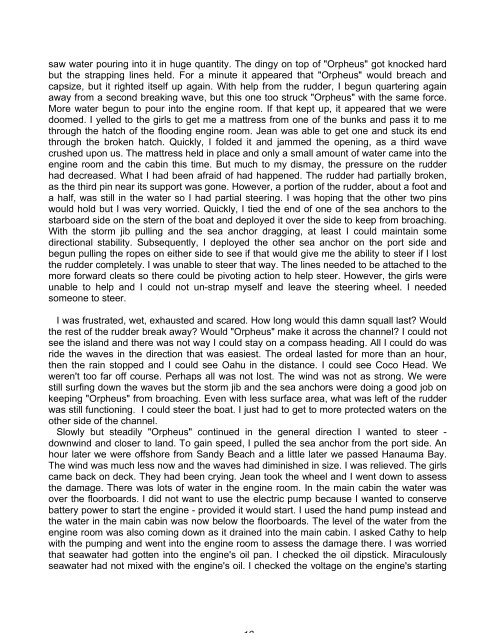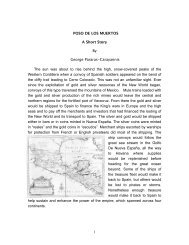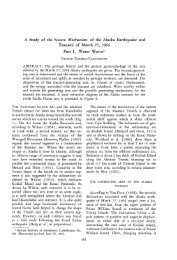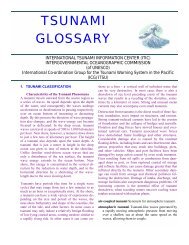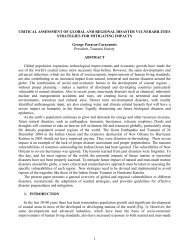Uncompressed 25.8 MB - Disaster Pages of Dr George, PC
Uncompressed 25.8 MB - Disaster Pages of Dr George, PC
Uncompressed 25.8 MB - Disaster Pages of Dr George, PC
Create successful ePaper yourself
Turn your PDF publications into a flip-book with our unique Google optimized e-Paper software.
18<br />
saw water pouring into it in huge quantity. The dingy on top <strong>of</strong> "Orpheus" got knocked hard<br />
but the strapping lines held. For a minute it appeared that "Orpheus" would breach and<br />
capsize, but it righted itself up again. With help from the rudder, I begun quartering again<br />
away from a second breaking wave, but this one too struck "Orpheus" with the same force.<br />
More water begun to pour into the engine room. If that kept up, it appeared that we were<br />
doomed. I yelled to the girls to get me a mattress from one <strong>of</strong> the bunks and pass it to me<br />
through the hatch <strong>of</strong> the flooding engine room. Jean was able to get one and stuck its end<br />
through the broken hatch. Quickly, I folded it and jammed the opening, as a third wave<br />
crushed upon us. The mattress held in place and only a small amount <strong>of</strong> water came into the<br />
engine room and the cabin this time. But much to my dismay, the pressure on the rudder<br />
had decreased. What I had been afraid <strong>of</strong> had happened. The rudder had partially broken,<br />
as the third pin near its support was gone. However, a portion <strong>of</strong> the rudder, about a foot and<br />
a half, was still in the water so I had partial steering. I was hoping that the other two pins<br />
would hold but I was very worried. Quickly, I tied the end <strong>of</strong> one <strong>of</strong> the sea anchors to the<br />
starboard side on the stern <strong>of</strong> the boat and deployed it over the side to keep from broaching.<br />
With the storm jib pulling and the sea anchor dragging, at least I could maintain some<br />
directional stability. Subsequently, I deployed the other sea anchor on the port side and<br />
begun pulling the ropes on either side to see if that would give me the ability to steer if I lost<br />
the rudder completely. I was unable to steer that way. The lines needed to be attached to the<br />
more forward cleats so there could be pivoting action to help steer. However, the girls were<br />
unable to help and I could not un-strap myself and leave the steering wheel. I needed<br />
someone to steer.<br />
I was frustrated, wet, exhausted and scared. How long would this damn squall last? Would<br />
the rest <strong>of</strong> the rudder break away? Would "Orpheus" make it across the channel? I could not<br />
see the island and there was not way I could stay on a compass heading. All I could do was<br />
ride the waves in the direction that was easiest. The ordeal lasted for more than an hour,<br />
then the rain stopped and I could see Oahu in the distance. I could see Coco Head. We<br />
weren't too far <strong>of</strong>f course. Perhaps all was not lost. The wind was not as strong. We were<br />
still surfing down the waves but the storm jib and the sea anchors were doing a good job on<br />
keeping "Orpheus" from broaching. Even with less surface area, what was left <strong>of</strong> the rudder<br />
was still functioning. I could steer the boat. I just had to get to more protected waters on the<br />
other side <strong>of</strong> the channel.<br />
Slowly but steadily "Orpheus" continued in the general direction I wanted to steer -<br />
downwind and closer to land. To gain speed, I pulled the sea anchor from the port side. An<br />
hour later we were <strong>of</strong>fshore from Sandy Beach and a little later we passed Hanauma Bay.<br />
The wind was much less now and the waves had diminished in size. I was relieved. The girls<br />
came back on deck. They had been crying. Jean took the wheel and I went down to assess<br />
the damage. There was lots <strong>of</strong> water in the engine room. In the main cabin the water was<br />
over the floorboards. I did not want to use the electric pump because I wanted to conserve<br />
battery power to start the engine - provided it would start. I used the hand pump instead and<br />
the water in the main cabin was now below the floorboards. The level <strong>of</strong> the water from the<br />
engine room was also coming down as it drained into the main cabin. I asked Cathy to help<br />
with the pumping and went into the engine room to assess the damage there. I was worried<br />
that seawater had gotten into the engine's oil pan. I checked the oil dipstick. Miraculously<br />
seawater had not mixed with the engine's oil. I checked the voltage on the engine's starting


